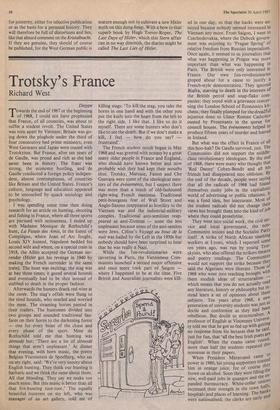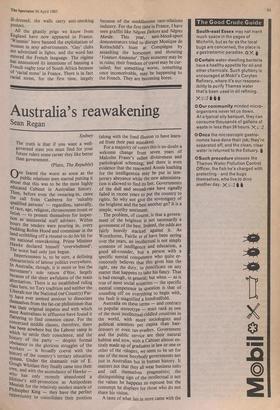Trotsky's France
Richard West
Dieppe Towards the end of 1967 or the beginning of 1968, I could not have prophesied that France, of all countries, was about to suffer a student revolt. The United States was torn apart by Vietnam; Britain was go- ing down the plughole under the third of four consecutive bad prime ministers; even West Germany and Japan were crazed with Trotskyism. But France, after ten years of de Gaulle, was proud and rich as she had never been in history. The franc was strong, the economy bustling, and de Gaulle conducted a foreign policy indepen- dent, almost contemptuous, of countries like Britain and the United States. France's culture, language and education appeared to be untouched by quack sociology and psychology.
I was spending some time then doing research for an article on hunting, shooting and fishing in France, where all three sports are pursued with seriousness. I ended up with Madame Monique de Rothschild's hunt, La Futaie des Amis, in the forest of Compiegne, where Joan of Arc fought, Louix XIV hunted, Napoleon bedded his second wife and where, on a special train in 1918, the Allies accepted the German sur- render (Hitler got his revenge in 1940 by making the French surrender in the same train). The hunt was exciting; the stag was at bay three times; it gored several hounds and eventually had to be shot instead of stabbed to death in the proper fashion.
Afterwards the hunters drank red wine at the curee. The stag's offals were flung to the tired hounds, who snarled and worried the meat. The steaming horses panted in their trailers. The huntsmen divided into two groups and sounded traditional fan- fares on their horns to the darkening forest — one for every beast of the chase and every phase of the sport. Mme de Rothschild told me that hunting was demode but: 'There are a lot of demode things that aren't unpleasant.' At dinner that evening, with horn music, the pretty Belgian Viscountess de Spoelberg, who sat on my right, said: 'We're very snooty about English hunting. They think our hunting is barbaric and we think the same about them. All that blooding. They say we make too much noise. But this music is better than all that fox-hunting toot-toot.' The equally beautiful huntress on my left, who was manager of an art gallery, told me of
killing stags: 'To kill the stag, you take the horns in one hand and with the other you put the knife into the heart from the left to the right side. I like that. I like to do it myself. There are some hunters who don't like to see the death. But if we don't make a kill, I feel — how do you say? — frustrated'.
The French student revolt began in May 1968 and was greeted with ecstasy by a great many older people in France and England, who should have known better and now probably wish they had kept their mouths shut. Trotsky, Marcuse, Fanon and Che Guevara were some of the ideological men- tors of the evenements, but I suspect there was more than a touch of old-fashioned right-wing French nastiness. Traditional petit-bourgeois fear of Wall Street and Anglo-Saxons reappeared as hostility to the Vietnam war and the industrial-military complex. Traditional anti-semitism reap- peared as anti-Zionism — none the less unpleasant because some of the anti-semites were Jews. Celine's Voyage au bout de la nuit was hailed by the Left in the 1930s but nobody should have been surprised to hear that he was really a Nazi.
While the fun-revolutionaries were cavorting in Paris, the Vietnamese Com- munists launched a second major offensive and once more took part of Saigon where I happened to be at the time. Five British and Australian journalists were kill- ed in one day, so that the hacks were an- noyed because nobody seemed interested in Vietnam any more. From Saigon, I went to Czechoslovakia, where the Dubcek govern- ment was enjoying its 'Prague Spring' of relative freedom from Russian imperialism. Once again, it seemed to us journalists that what was happening in Prague was more important than what was happening in Paris. The British were only interested in France. Our own fun-revolutionaries groped about for a cause to justify a French-style demonstration. They ignored Biafra, starving to death in the interests of the British petrol and soap-flake com- panies; they toyed with a grievance concer- ning the London School of Economics kit- chens; they finally plumped for the dreadful injustice done to Ulster Roman Catholics ousted by Protestants in the queue for council houses. The evenements helped to produce fifteen years of murder and hatred in Ireland.
But what was the effect in France of all this hoo-hah? De Gaulle survived, just. The Communists did not support the middle- class revolutionary ideologues. By the end of 1968, there were many who thought that 'Red Danny' Cohen-Bendit and all his friends had disappeared into oblivion. By the end of the decade, people were saying that all the radicals of 1968 had found themselves cushy jobs in the capitalistic world of advertising or public relations. It was a fond idea, but inaccurate. Most of the student radicals did not change their views but brought them into the kind of job where they could proselytise.
They went into social work, the civil ser- vice and local government, the non- Communist unions and the Socialist Party itself. A strike of North African smelting workers at Lyons, which I reported some ten years ago, was run by young Trot- skyists, who also offered the strikers theatre and poetry readings. The Communists would not support the strike because they said the Algerians were iliterate. Those of 1968 who went into teaching brought with them modish ideas of structuralism ---, which means that you do not actually read any literature, history or philosophy but in- stead learn a set of opinions about these subjects. Ten years after 1968, a new generation of university students was just as docile and conformist as they had been rebellious. But docile to structuralism. A. professor of English at Vincennes I.Jniverst- ty told me that he got so fed up with getting no response from his lectures that he said just for fun, that 'all the best Irish poets are English'. When the exams came round more than half the students repeated this
nonsense in their papers. o When President Mitterrand came t,
power in 1980, his young supporters toastea him in orange juice, for of course thheYe frown on alcohol. Soon they were filling t new, well-paid jobs in quangos and the ex- panded bureaucracy. White-collar tinhi°11s, increased their strength in the town a hospitals and places of learning. The bain'f, were nationalised; the clerks are surly and
ill-dressed; the walls carry anti-smoking posters.
All the ghastly prigs we know from England have now appeared in France. Wimmin' have banned the exploitation of women in sexy advertisments. 'Gay' clubs are advertised in lights, and the word has entered the French language. The regime has announced its intentions of banning a French rugby tour of South Africa because of 'racial stress' in France. There is in fact racial stress, for the first time, largely
because of the meddlesome race-relations industry. For the first time in France, I have seen graffiti like Negres Dehors and Negres Merde. This year, anti-blood-sport demonstrators tried to disrupt Monique de Rothschild's hunt at Compiegne by assaulting the horsemen and shouting Veneurs Assassins'. Their economy may be in ruins; their freedom of travel may be cur- tailed; but something worse, something once inconceivable, may be happening to the French. They are becoming bores.











































 Previous page
Previous page